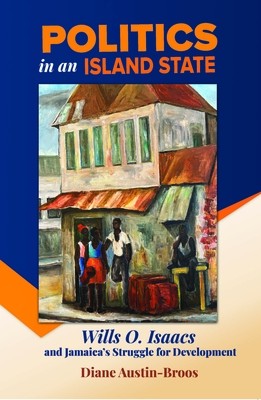
- We will send in 10–14 business days.
- Author: Diane Austin-Broos
- Publisher: University of the West Indies Press
- ISBN-10: 9766409595
- ISBN-13: 9789766409593
- Format: 15.2 x 22.9 x 2.7 cm, minkšti viršeliai
- Language: English
- SAVE -10% with code: EXTRA
Reviews
Description
During the
decades of the mid-twentieth century, Wills O. Isaacs was a prominent member of
the People's National Party. He was then, and remains, one of Jamaica's most
controversial figures; beloved by many and reviled by some both within and
beyond his party. Isaacs joined the People's National Party soon after its
official launch in 1938. Quickly he became a leading nationalist, and a
strategist within the PNP. Isaacs' early work was in union organization and in
building local constituency groups, including one intended to attract the
commercial class. Another, formed in downtown Mathews Lane, brought him
notoriety. In later years, Group 69 was sometimes seen as a precursor to
Kingston's garrisons and the wars between constituencies allied to one or the other
major party. Isaacs' first elected position was on the KSAC council where he
served from 1943 to 1954. Elected to parliament in 1949, he held a Central
Kingston seat until 1967. In that year, he was elected to the rural
constituency of St Ann North East and re-elected in 1972.
Throughout
his career, Isaacs was a nationalist and a social democrat who identified as a
socialist. As a champion of the unemployed and the racially vilified, he
condemned capitalism's social failures. He also condemned the market failures
involved in cartels and private monopolies. Consequently, he supported some
nationalization, especially of Jamaica's central services. Yet, he did not
foreclose on capitalism and looked for a détente between classes. His main
target was totalitarianism, both of the right and the left, and of the various
nineteenth and twentieth century imperialisms. Isaacs' nationalist ire was
raised equally by British treatment of African peoples of the trans-Atlantic,
and by the fate of Europeans overwhelmed in turn by Nazi Germany and Stalin's
Russia. He described the path of the PNP as one between "the red shirts" and
"the black shirts".
EXTRA 10 % discount with code: EXTRA
The promotion ends in 23d.17:50:36
The discount code is valid when purchasing from 10 €. Discounts do not stack.
- Author: Diane Austin-Broos
- Publisher: University of the West Indies Press
- ISBN-10: 9766409595
- ISBN-13: 9789766409593
- Format: 15.2 x 22.9 x 2.7 cm, minkšti viršeliai
- Language: English English
During the
decades of the mid-twentieth century, Wills O. Isaacs was a prominent member of
the People's National Party. He was then, and remains, one of Jamaica's most
controversial figures; beloved by many and reviled by some both within and
beyond his party. Isaacs joined the People's National Party soon after its
official launch in 1938. Quickly he became a leading nationalist, and a
strategist within the PNP. Isaacs' early work was in union organization and in
building local constituency groups, including one intended to attract the
commercial class. Another, formed in downtown Mathews Lane, brought him
notoriety. In later years, Group 69 was sometimes seen as a precursor to
Kingston's garrisons and the wars between constituencies allied to one or the other
major party. Isaacs' first elected position was on the KSAC council where he
served from 1943 to 1954. Elected to parliament in 1949, he held a Central
Kingston seat until 1967. In that year, he was elected to the rural
constituency of St Ann North East and re-elected in 1972.
Throughout
his career, Isaacs was a nationalist and a social democrat who identified as a
socialist. As a champion of the unemployed and the racially vilified, he
condemned capitalism's social failures. He also condemned the market failures
involved in cartels and private monopolies. Consequently, he supported some
nationalization, especially of Jamaica's central services. Yet, he did not
foreclose on capitalism and looked for a détente between classes. His main
target was totalitarianism, both of the right and the left, and of the various
nineteenth and twentieth century imperialisms. Isaacs' nationalist ire was
raised equally by British treatment of African peoples of the trans-Atlantic,
and by the fate of Europeans overwhelmed in turn by Nazi Germany and Stalin's
Russia. He described the path of the PNP as one between "the red shirts" and
"the black shirts".


Reviews